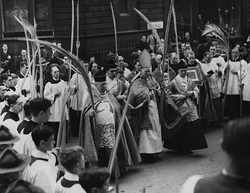
Today we begin Holy Week, the week in which we centre our thoughts and affections on the final hours of the mortal life of Jesus Christ, the hours of His Passion and Death. The first part of the week leads up to Good Friday, the day on which we commemorate the sorrowful death of Our Saviour on Mount Calvary. There are two days on which a note of joy and triumph is found in the Church's liturgy--Palm Sunday and Holy Thursday. Today we remember the dramatic entrance of Christ into Jerusalem, while the people stewed branches of palms before Him, and in spirit we repeat their exultant cries: “Hosanna to the Son of David; blessed is he who comes in the name of the Lord.” Many of those who welcomed Him with these words recognised Him only as a great prophet, but we know that He is the true Son of God as well as the Son of David, and our act of homage is an acknowledgement of His divinity.
Holy Thursday, too, brings the joyful remembrance of the miracle of divine power and love whereby Our Lord gave us His own body and blood in the sacrament of the Holy Eucharist. On that day the priest celebrates Mass in the white vestments of joy and gladness, and after Mass the Blessed Sacrament is placed in the repository, so that the faithful may visit Our Divine Saviour to thank Him for the great gift of the Holy Eucharist and to ask Him for the favours and graces they need both for body and for souls.
However, the predominant sentiment of the Church in Holy Week is sadness and sympathy for Our Blessed Lord in His sufferings. Uppermost in our minds should be the doctrine of Our faith that the purpose of Christ in submitting to the pain and the ignominy of His Passion was to make satisfaction to His Father for the sins of mankind. We should relate this thought to our own individual lives and realise that every sin we ever committed, whether mortal or venial, had its particular share in inflicting suffering on the Son of God. While this thought should be in our minds especially on Good Friday, it should be frequently recalled during the entire week.
Practical Application
One of the most important acts of every good Catholic in the course of Holy Week is to make a good confession, in a spirit of deep repentance for his sins that have caused the death of Jesus Christ. If possible, receive Holy Communion on Holy Thursday, but above all, prepare for a fervent Holy Communion on Easter Sunday, that you may thus share in Our Lord's joy and glory.




